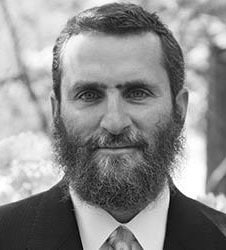The patriarch Jacob, my namesake (Jacob Shmuel) of whom we have read the past few weeks in the Bible, is the most maligned of all the patriarchs. He is the one whom non-Jews can do without. The Christians claim to have been grafted onto the seed of Abraham and the Muslims make equal claim to the father of Monotheism as the Jews. But Jacob, with his seeming deception of his blind father to gain the firstborn blessing from Esau and his commercial manipulations of his father-in-law Laban, most of whose flock he eventually owned, is treated by anti-Semites as the prototype of the wily, cunning, dishonest Jew who will do anything to profit. Jacob is the forerunner of Shylock who mourns more for his lost ducats then his lost daughter Jessica. He is the father, they say, of the modern State of Israel that will engage in questionable moral tactics to fight off its enemies.
And yet, the Jews celebrate Jacob and call themselves his, rather than Abraham’s, offspring. We are the children of Israel, the name given to Jacob after he wrestled with, and defeated an angel. Why celebrate a man of seeming deceit?
Because Jacob was the first patriarch who decided he would enter into the arena with evil, fight it, and defeat it. He was unconcerned at what damage this would do to his reputation. He knew Esau was violent and dangerous and would have abused the power that would have come with the firstborn blessing. He was determined to stop him one way or another, even if it partially impugned his soul. The same was true of Laban, whose wealth would be abused and misused and was in any event owed to Jacob for fourteen years of unpaid labor.
There are those who believe that religion should distance itself from the corruption of the world and maintain an unblemished integrity. Monastic life, divorced from the affairs of a society ruled by greed and avarice, is where the pious flourish. Even in the Jewish world there are many who believe that the righteous man spends his life studying unsullied by materialism or commerce. They should likewise avoid service in the Israeli army because fighting evil taints the fighter and lacks the innocence of pure Torah study. And in any event, the army is not sufficiently religious and ritual commitment will suffer in its godless environment.
To some degree this was the posture adopted by Abraham who was known as Ha’ivri, the Hebrew, the man who sets himself apart. The kernel of monotheism, having just been birthed by Abraham was, he felt, too vulnerable to be exposed to the world malevolent influence. So he cloistered himself from immoral people like Soddom and Gomorra’s inhabitants. Yes, he would pray for their welfare from afar, but he would not live among them, attempt to influence them, or even combat their wickedness. Isaac, who was a holy offering brought on G-d’s altar likewise lives apart and is prohibited by G-d from sojourning in the fleshpots of Egypt.
Only Jacob engages the world and courageously confronts the wicked allowing goodness to triumph. Yes, at times he will fight them on their own terms – even employ their own means – to defeat them. But he will not let the world be ruled by wicked men. One way or another, he will stop them. And it is as a result of this courageous posture to fight G-d’s battles that his name is changed from Jacob – he who is stepped on by the heal – to Israel, he who wrestles with G-d and man and triumphs. In the act of this constant struggle against malevolent forces who seek to defeat him, Jacob gives birth to a new concept of religion whose theme is captured by that name. Not the subservient man of the spirit, but the rebellious man of faith.
Indeed, it is those who are prepared to fight evil even when accused of becoming unethical in the process that are vindicated by history as having saved civilization from monstrous injustice. Lincoln suspected habeus corpus, insisted on continuing the bloody engagements of the civil war when there was an outcry for peace, and was labeled a bloodthirsty tyrant for doing so. Today we remember him as our greatest president who purged America of the abomination of slavery and kept the Union intact. While Chamberlain waved his useless piece of paper proclaiming ‘peace in our time’ and portrayed himself as an ethical man unwilling to shed blood, Churchill was dismissed a warmonger and alarmist provoking a fight with Hitler. He would later be accused of mass butchery in leveling cities like Hamburg and Dresden to finish off the Third Reich. Yet today he is remembered as the 20th century’s greatest statesman.
When I was in Oxford I heard world-renowned Jewish academics lamenting the State of Israel’s existence. Prior to its creation, they maintained, the Jews had the respect of the world as the people of the book and the pity of humanity as Hitler’s victims. Now we were the people of the M-16 and seen as oppressors of the Palestinians. Yet these moral cowards would have Hezbollah, Hamas, and Iran take over the Middle East in order for the Jews to maintain a false morality, predicated on ethical self-preservation while the world is overtaken by darkness. The desire to remain aloof from the world’s affairs and allow wicked men to gain supremacy is piety of cowards and betrays a fraudulent faith.
For thousands of years religion has been perceived as demanding and inculcating obedience. Faith demands the bowing of the head to the unassailable will of G-d. Islam translates literally as submission and a Muslim is one who lives a life of obedience to G-d’s law. The great Danish Christian theologian Soren Kierkegaard likewise said that true Christianity demands not understanding or challenge but a leap of faith.
But Judaism imparted to the world a revolutionary vision of global social transformation and change. The time would come when men and women, through their defiance, would cure the world of seemingly intractable ills. War itself would be defeated as would disease and hunger. Human suffering, Judaism taught, was not the fault of sinful man. Rather, the man of faith was he who demanded of G-d Himself to keep his promises and His injunctions to choose life. After sending Moses to free the Israelite slaves of Egypt and Pharaoh’s cold response that their suffering would increase through the withholding of straw, Moses does not return to G-d with head bowed low, accepting the brutality inflicted on his people as G-d’s will. “Why have you acted so wickedly to this people,” he says to the Creator of the Universe, “and from the time you have sent me you have done nothing to save this nation.” The rebellious man of faith will continue to worship G-d after Auschwitz but He will never excuse G-d’s seeming callousness in allowing a holocaust against innocents. To the contrary, as the Lubavitcher Rebbe, the greatest Jewish religious leader of modern times, shouted in public on countless occasions, defiantly and with fists pounding the table, “Ad Mosai,” How long Oh Lord will you remain silent as people suffer and die? How long will it be before you fulfill your promise to perfect the world and defeat death. It’s flaws are now Your responsibility. We have been a faithful nation for generations. Our suffering is due not to our sin or shortcoming but to Your failure to keep your promise.”
While his own father-in-law, Rabbi Joseph Isaac Schneerson, the previous Rebbe, whom he adored and to whom he was incomparably devoted, wrote of the holocaust as possible divine retribution from Jewish abrogation of G-d’s covenant, on this matter and on this alone the Rebbe broke ranks. We could never understand why G-d would allow such suffering to be visited on his people, he said. Week after week, well into his eighties, he would thunder in front of thousands of his students. How long will Israeli soldiers die for simply protecting the Jewish people from further annihilation? When a bus carrying Israeli school children was hit by a train, killing 27, and the orthodox Israeli minister of the interior said they had died because of Israelis’ disrespect for the Sabbath, the Rebbe dismissed his chutzpah in adding insult to injury and raged against the heavens instead. There was no reason for these children to die. G-d had commanded through his prophet Moses to choose life. Why had He not chosen thus Himself?
And, my G-d, my G-d. If only our Muslim brothers and sisters did the same, ceasing the bowing of heads to fanatical Mullahs who pervert Islam in favor of their personal hatreds and insist that the faithful accept their exhortation to violence even as these foul teachings betray the humanity of a religion that took in Jewish refugees after the Spanish and Portuguese expulsions when the Jews were the most hated nation on earth.
The faithful have been obedient long enough. It is time for the emergence of the new defiant man of faith, steeped in the tradition of Jacob, refusing to allow the iron hoofs of evil to tread upon the vulnerable flesh of the innocent and the soft and trusting heart of the righteous.
Rabbi Shmuley Boteach has just published Ten Conversations You Need to Have with Yourself (Wiley) and will shortly publish Kosher Jesus. Follow him on Twitter @RabbiShmuley























 More news and opinions than at a Shabbat dinner, right in your inbox.
More news and opinions than at a Shabbat dinner, right in your inbox.